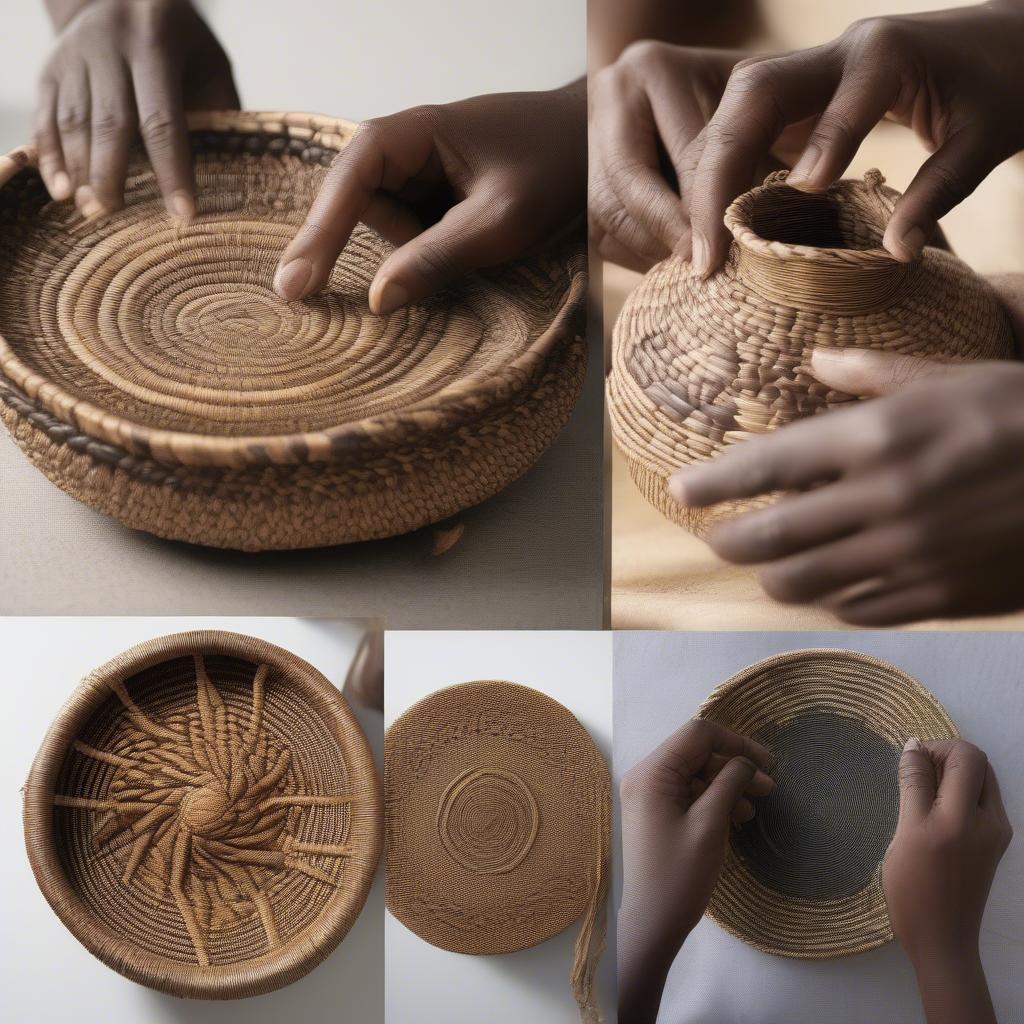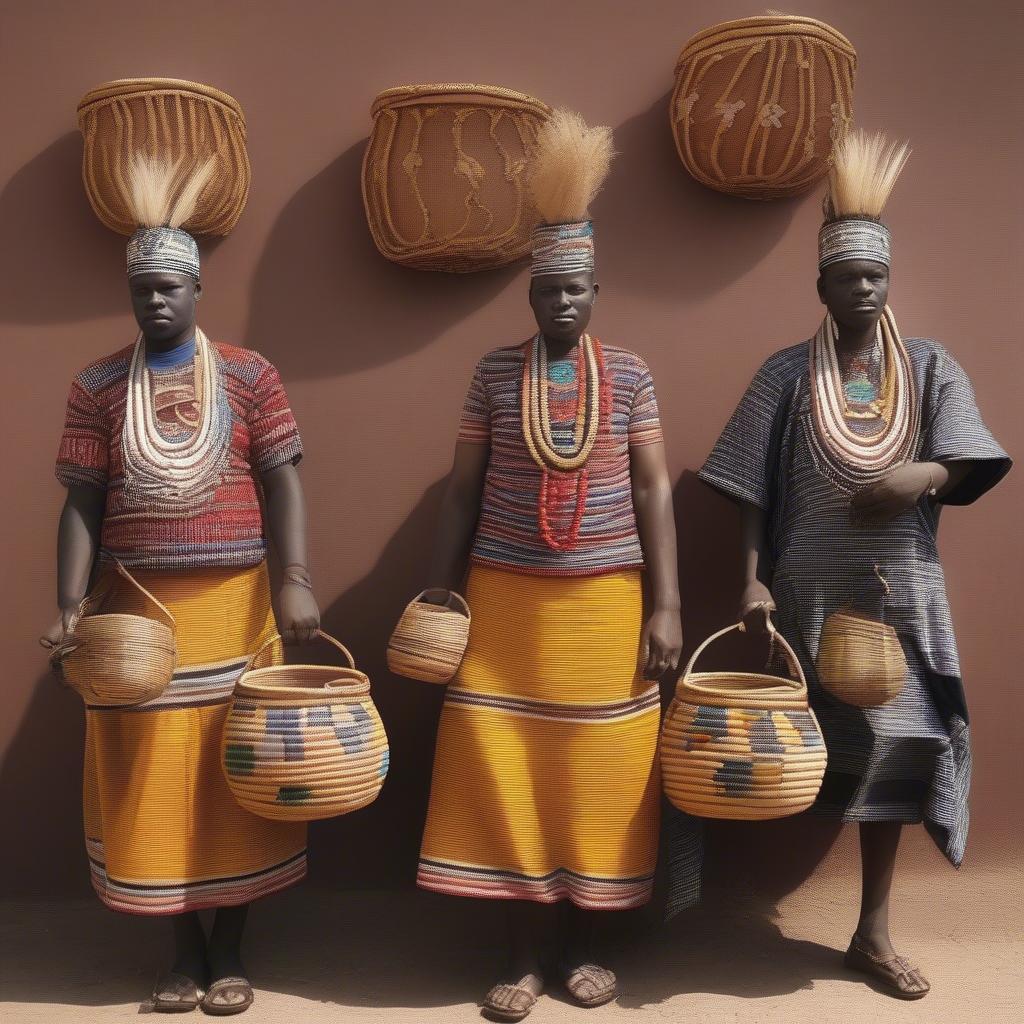Basket Weaving
Exploring the Art of African Basket Weaving
African basket weaving is a rich and diverse tradition, deeply ingrained in the cultures of numerous communities across the continent. From utilitarian storage solutions to intricate works of art, these baskets tell stories, preserve heritage, and showcase the incredible skill and creativity of African artisans.
A Journey Through African Basket Weaving Techniques
African basket weaving isn’t a monolithic craft; it encompasses a wide array of techniques, materials, and styles, each unique to its region and tribe. Some weavers specialize in coiling methods, meticulously stitching together grasses and reeds to create sturdy, functional baskets. Others employ intricate twining and plaiting techniques, producing complex patterns and designs that elevate baskets to the realm of fine art. The diversity of materials used is equally impressive, ranging from readily available grasses and palm leaves to more specialized materials like sisal, raffia, and even recycled plastic.
 Various African Basket Weaving Techniques
Various African Basket Weaving Techniques
The Cultural Significance of African Basket Weaving
Beyond their practical uses, African baskets hold deep cultural significance. They are often used in ceremonies, rituals, and everyday life, representing cultural identity, social status, and spiritual beliefs. In some communities, specific patterns and designs woven into the baskets tell stories, convey messages, or represent clan affiliations. These baskets are more than just containers; they are vessels of culture, passed down through generations, preserving traditions and knowledge.
 Cultural Significance of African Baskets in Ceremonies
Cultural Significance of African Baskets in Ceremonies
From Traditional Crafts to Contemporary Art: The Evolution of African Basket Weaving
While rooted in ancient traditions, African basket weaving is not static. Contemporary artists are pushing the boundaries of this ancient craft, incorporating new materials, experimenting with innovative techniques, and creating stunning works of art that resonate with modern audiences. They are blurring the lines between traditional crafts and contemporary art, showcasing the versatility and enduring appeal of African basket weaving in the 21st century.
Supporting Sustainable Practices in African Basket Weaving
Many African basket weavers are committed to sustainable practices, using locally sourced and renewable materials, and employing traditional methods that minimize environmental impact. By supporting these artisans, we not only contribute to the preservation of cultural heritage but also promote responsible and ethical consumption.
Where to Find Authentic African Baskets
Authentic African baskets can be found in fair trade shops, online marketplaces, and directly from artisans. It’s important to choose vendors who prioritize ethical sourcing and fair compensation for the artisans. By supporting these businesses, we can help ensure that the rich tradition of African basket weaving continues to thrive.
Conclusion
African basket weaving is more than just a craft; it’s a vibrant expression of culture, artistry, and heritage. By appreciating the intricate techniques, diverse materials, and cultural significance of these baskets, we can gain a deeper understanding of the rich artistic traditions of Africa.
FAQ
-
What are the most common materials used in African basket weaving?
Common materials include grasses, reeds, palm leaves, sisal, and raffia. -
How long does it take to weave a traditional African basket?
The time varies depending on the size, complexity, and technique used, ranging from a few hours to several weeks. -
Are African baskets only used for storage?
No, they are also used in ceremonies, rituals, and as decorative pieces. -
How can I tell if an African basket is authentic?
Look for signs of hand craftsmanship, natural materials, and unique designs. -
Where can I buy authentic African baskets?
Fair trade shops, online marketplaces specializing in ethical crafts, and directly from artisans. -
What is the significance of patterns in African basket weaving?
Patterns often tell stories, represent clan affiliations, or convey messages. -
How can I support sustainable practices in African basket weaving?
Buy from vendors who prioritize ethical sourcing and fair compensation for artisans.
Are there any other questions you have about African basket weaving or related topics? Check out our other articles on basket weaving traditions from around the world.
For any assistance, please contact us at Hanoi, Vietnam or Tech Avenue, Suite 12, San Francisco, CA 94105, USA. We have a 24/7 customer service team.
